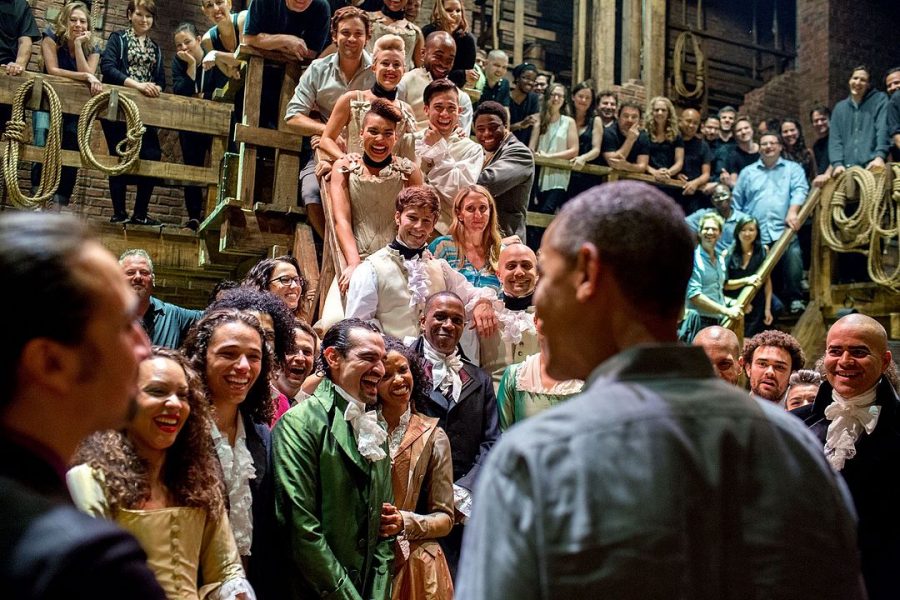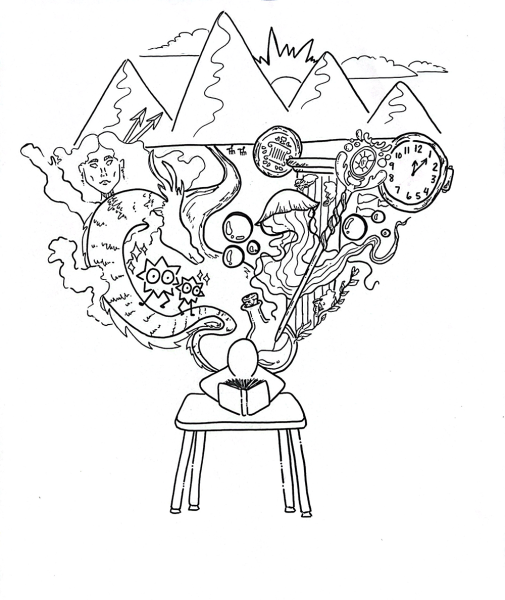Hamilton and the Dangers of Historical Revisionism
Official White House Photo by Pete Souza
President Obama meeting the cast of Hamilton in 2015.
“History is a gallery of pictures in which there are few originals and many copies.”
-Alexis de Tocqueville
Hamilton is a hip-hop musical about the career of the titular American founding father, written by Lin-Manuel Miranda, which premiered on Broadway in 2015. Since then, Hamilton has run the circuit from overnight success to cult classic and generational touchstone.
A recording of Hamilton, performed by the original Broadway cast, is set to release on the streaming platform Disney+ on July 3rd, and, in light of this, it seems appropriate to reevaluate the thematic, historic and ideological heart of the show.
Hamilton has always suffered from a heady case of “the medium is the message”. In its heyday, tickets to see the show sold for thousands of dollars, and, if you couldn’t afford to spend thousands of dollars on a show, you were directed to a laughably flaccid ticket lottery. Seeing Hamilton was only possible through deep pockets or divine intervention.
As such, it is hard to attribute any egalitarian message to a musical whose popularity, even today, lives off of a consumerist sense of exclusivity. Now, to enjoy Hamilton like the tasteful courtier you are, you must purchase a Disney+ subscription. Fortuitously, the transition of entertainment from television to streaming platforms has introduced a healthy sense of class distinction between the plebian Hulu subscribers and the patricians who stream HBO and Disney+.
Brushing that odious paywall aside, Hamilton yields itself to a fascinating analysis of the art of historical revisionism. It is not in the interest of this analysis to list off the myriad ways in which Miranda has tweaked Hamilton’s biography in the interest of narrative cohesion.
It may be entertaining to nitpick, pointing out that Burr, rather than being a close friend of Hamilton’s before their tragic duel, was more of an acquaintance on the periphery of Hamilton’s social circle, or that Angelica Schuyler, in fact, had already been married when she met Hamilton.
But it is much more enlightening to examine how Hamilton dilutes, rearranges and distorts history, crafting an account of the American Revolution that runs counter the consensus historians have reached. Let us examine the changes significant to theme rather than the changes significant to storytelling.
While not outright lying to its audience, Hamilton engages in a sort of selective omission. This is a powerful tool for political propaganda. Case in point, American white supremacists often point out that, in the Atlantic Slave Trade, the majority of black slaves were abducted and sold into chattel slavery by other Africans.
While this is not a lie, it is a malicious use of history, as it obscures the role of white imperialists in the slave trade. A person rattling off this tidbit of historical information makes no mention of how the institution of slavery has shaped privelege and policy in the United States.
Their exigence is to circulate a historical narrative in which white privilege is nonexistent and black people are at fault for their own subjugation. Unlike this “self-enslavement” canard, Hamilton’s selective omission is neither as transparently dishonest or malicious. And still, it works to deceive an audience into internalizing a false image of the past, without the risk of being caught in an outright lie.
With this in mind, let’s examine the opening lines of Hamilton.
“How does a bastard, orphan, son of a whore
And a Scotsman, dropped in the middle of a forgotten spot
In the Caribbean by providence impoverished
In squalor, grow up to be a hero and a scholar?”
Let’s contrast this to a primary source on Hamilton’s paternity, a letter he wrote to one William Jackson in 1800.
“The truth is that on the question of who my parents were, I have better pretensions than most of those who in this Country plume themselves on Ancestry.”
These sources seem to contradict each other. The musical presents Hamilton as a vagrant diamond in the rough, while Hamilton attests that he is of pretty substantial birth. This line is as telling as it is ironic; Hamilton here both brushes aside and justifies the importance of birth status, as if to say, “Not that it really matters, but I come from extremely pristine stock.”
This is the closest Hamilton ever comes to lying to its audience. The stanza from the musical is built of half-truths and omitted facts, crafting an image of the founding father that runs counter to how he wanted to be seen.
The truth, as it usually is, is somewhere in the middle. Alexander Hamilton’s mother was not a prostitute. As discussed in Ron Chernow’s biography, Rachel Faucette was a middle class woman of French Huguenot extraction who had been born into a slave-owning family. She inherited her father’s Nevis sugar plantation after his death in 1745, and resided at a large estate on St. Croix, “The Grange”, which was owned by her maternal grandparents. Her life was tainted by scandal when her first husband, a Danish doctor named Lavien, accused her of infidelity during a messy, public divorce (Lavien went as far as to manipulate outdated colonial law and imprison his unhappy wife). “Whore”, it appears, is used as a reverse-euphemism for “divorcee”.
Hamilton’s father, James Hamilton, was indeed a Scotsman, but he was also the son of a Scottish Laird, and had been raised in the family’s castle, positioned on the British coast. A failed merchant, James Hamilton was certainly somewhat estranged from his noble-born family, but the fact remains that Hamilton came from minor nobility.
It must also be noted that Hamilton was not truly an orphan until his mother died. The song mentions his mother’s death later on, but the first stanza seems to imply that Alexander’s father died when he was relatively young. The song explains that Hamilton’s father “quit, full of it, debt-ridden”, and leaves James Hamilton there. In reality, Hamilton’s father died in 1799, several years after Hamilton already completed his term as America’s First Secretary of the Treasury.
As to the bastard part, according to Chernow, Hamilton actually spent a substantial amount of time arguing that his illegitimacy was a de-jure clerical inconvenience, caused by his mother’s first marriage, and that his parents, regardless of their lack of a marriage license, had lived in pious Christian monogamy.
This image of Alexander Hamilton as a penniless, godforsaken wretch is hyperbole. Young Hamilton was faced with a healthy deal of misfortunes. His father abandoned his family early on. His mother died in a horrific fever, which Hamilton himself contracted. Soon afterwards, Lavien, his mother’s first husband, swept in to steal Hamilton’s entire inheritance. Hamilton, as the song mentions, lived through the horrific suicide of his cousin, with whom he was living after his mother died. And, perhaps most importantly, Hamilton’s Caribbean birth triggered xenophobic assertions that he was no more than a foreign agitator and conspiracy theories that he was biracial.
And yet, Hamilton wasn’t truly of humble origins. Hamilton was of humbler origins than many of his colleagues, scions of old-money colonial families and residents of opulent slave plantations. Hamilton didn’t come from dirt, he came from failed nobility and Caribbean bourgeoisie. In Hamilton’s childhood, his mother owned five house-slaves, and assigned one of them, a boy named Ajax, to be Alexander’s personal servant.
On its own, this may seem like a minor point. So Hamilton was more privileged than the musical lets on. What does this change do to the message of the musical? Is an exaggeration of Hamilton’s poverty all that relevant to the overall thematic structure?
Let us first consider the construction of national myth and national identity. The musical rather bluntly frames Alexander as the archetypal American, outright saying that he’s “just like [his] country [:] young, scrappy, and hungry.”
Consider, as an analogous example, the legend of Romulus and Remus, the two boys nursed by a she-wolf who would later found Rome. Many Roman historians doubted this story, and put forth the hypothesis that the legend began as a mistranslation of the word “lupa”, which can mean either female wolf or prostitute.
Today, most historians agree that the story is either complete fiction or so obscured by the passage of time that it may be given no more credence than complete fiction. But that minor detail, the replacement of a prostitute with a wolf, is crucial to the Roman national mythology.
Rome, says this national myth, was born out of divine intervention, out of nature willing these children to survive, so that they may build a city, which, like their survival in the wild, was willed by creation.
Likewise, by using revisionism to frame Hamilton as humble, lower class, and hardworking, Hamilton betrays a certain idealistic bend. Hamilton argues that America rewards hard work, is blind to birth status, and is, overall, a force for good. “A place where even orphan immigrants can leave their fingerprints.”
Now, to better understand how Hamilton builds a national myth, let’s discuss the reality and significance of the American Revolution. According to most modern historians, the American Revolution was a “bourgeois revolution”; wealthy merchants, plantation owners, and speculators, benefactors of the brand-new capitalist mode of production, carried out a revolution against the last vestiges of feudal power.
The revolutionaries of the American Revolution were not preoccupied with the treatment of the poor, the misfortune of the oppressed, or the violation of human rights. They may very well have played populist lip-service to the notion of “unalienable rights”; but the War of Independence had been waged to protest the implementation of unjust taxes by the British monarchical apparatus. The war was waged by the rich, who no longer wanted to pay taxes to a monarchy.
Hamilton rebrands the bourgeois revolution of 1776 as an egalitarian social revolution. Alexander Hamilton goes from wig-wearing New York burgher to working-class hero. To illustrate how this anachronistic rebranding is achieved, let’s analyze the evolution of one of the show’s key motifs: “rise up”.
In the show, “to rise up” carries two very different meanings. Throughout the show, Hamilton “rises up” in the sense that he ascends the ladder of the social hierarchy. Hamilton acquires an education, a position in the military, a wealthy wife, a business, and, finally, a position at President George Washington’s side.
As Hamilton himself explains, “As a kid in the Caribbean I wished for a war / I knew that I was poor / I knew it was the only way to rise up”. However, “rise up” can also mean “rise up in arms”, as in topple the existing socio-economic system. This is how the phrase is used when Hamilton asks, “When are these colonies gonna rise up?”
In essence, the musical equates the two forms of “rising up”. Ascending the hierarchical ladder is the goal of a bourgeois revolutionary, breaking with the established order is the goal of the social revolution. Through this subtle motif, the musical equates the two revolutionary ideals. We will discuss the political implication of this rebranding, but now let us explain why presenting Hamilton as the leader of a modern, working-class social revolution is an act of revisionism.
To the show’s credit, if you were to choose a founding father to rebrand in this way, Hamilton would be the obvious choice. Hamilton was shockingly ahead of his time with regard to abolition; even those American politicians of the critical period who didn’t own slaves, and perhaps even spoke out against slavery, kept their opinion close to their chest, in fear of alienating potential slave-owning supporters.
However, Hamilton is only a populist hero in comparison to his colleagues. In this sense that concept of “selective omission” really drives the analysis. Miranda strikes through the beliefs and actions of Hamilton that would disqualify him from the revolutionary mantle given to him by the play.
As you would know from having watched the musical, Hamilton marries into the Schuyler family, a wealthy clan from upstate New York. The musical fails to mention that Philip Schuyler’s Albany Mansion and farmlands were tended by slaves.
Reading the Chernow biography exposes a Hamilton very unlike the one from the musical. While any evidence we have that Alexander Hamilton owned slaves is hotly contested, we know for a fact that, on at least one occasion, Hamilton acted as an intermediary for slave trade. In 1797, he bought two slaves for his brother-in-law John Church (husband of Angelica), and then sent Church a bill.
Hamilton also supported the Alien and Sedition Acts, which made it easier to deport immigrants and harder for immigrants to vote. We even have a quote from Hamilton in which he defends child labor in factories, explaining that it’s good for both the family’s finances and the child’s upbringing.
Most shockingly, Hamilton gave a speech at the constitutional convention in which he advocated for a hereditary monarchy in the United States (the infamous June 18th “Plan of Government” speech). Of course, Hamilton was the product of his very ignorant, very cruel time, and yet the record of Hamilton’s life and story is obscured for the purpose of thematic restructuring.
Many people will similarly argue that it is inappropriate to present Alexander Hamilton as a revolutionary hero, because Hamilton is so intimately connected to the tradition of American capitalism. This is a much subtler point since, during Hamilton’s time, there was no distinction between the capitalist right and the socialist left.
Hamilton was pro-business, and was supported by bankers and industrialists, but it is not as if his opponents were proto-socialists. Jefferson, Hamilton’s sworn enemy, may have used populist propaganda to his advantage, calling Hamilton an uppity New York businessman, but the fact remains that Jefferson was himself a slave-owning aristocrat. Perhaps someone could extrapolate some conservative, capitalist message from Hamilton, but this message is neither especially potent in the musical or critical to our reading.
What is the harm in this revisionism? One could make an argument that this revisionism is, if anything, positive. The act of assigning an egalitarian role to Hamilton, to reframing the American Revolution as a social revolution, to retell the story of American Revolution through the lens of 21st century social justice, can be read as an attempt to assert the rights of people of color, and other marginalized groups, within the United States. After all, regardless of the political motivations or moral decisions of the founding fathers, the United States is a nation in which people of color can vote (sometimes) and everyone is equal in the eyes of the law (sometimes).
In Hamilton, we can see an attempt to reorient America away from the vapidity of property rights and towards more enlightened philosophies of social justice. Hamilton quite literally takes old white men and recasts them as handsome and hip people of color.
However, revisionism is, and always will be, revisionism. By marrying the American Revolution to social revolution, are we promoting social justice, or convincing people that they already have it, and that there’s no use in struggling further? Does Hamilton encourage us to examine how our political institutions may have aged poorly, or does Hamilton cover our political institutions in a coat of “woke” paint? Is Hamilton an escapist fantasy into an alternate history in which the founding fathers were better people, or is it empty propaganda, working to convince us that the founding fathers were good people? Does Hamilton promote toxic American exceptionalism?
In Sapiens: A Brief History of Humankind, historian Yuval Noah Harrari explains national identity as the manifestation of a “collective fiction”. In a section in which he discusses the “imagined order” imposed by states and religions, describing law, property, and justice as pieces of an illusion constructed by society, he writes the following:
“In order to change the imagined order I must convince millions of strangers to cooperate with me. For the imagined order is not a subjective order existing in my own imagination, it is, rather, an intersubjective order, existing in the shared imagination of thousands and millions of people. … The dollar, human rights, and the United States of America, exist in the shared imagination of billions, and no single individual can threaten their existence. If I alone were to stop believing in the dollar, human rights, and the United States, it wouldn’t much matter. These imagined orders are intersubjective, so in order to change them, we must simultaneously change the consciousness of billions of people, which is not easy. A change of such magnitude can be accomplished only with the help of a complex organization such as a political party, an ideological movement, or a religious cult [or a hip-hop musical]. However, in order to establish such complex organizations, it’s necessary to convince many strangers to cooperate with one another. And this will happen only if these strangers believe in some shared myths. It follows that in order to change an existing imagined order, we must first believe in an alternative imagined order. … There is no way out of the imagined order. When we break down our prison walls and run towards freedom, we are in fact running into the more spacious exercise yard of a bigger prison.”
If Harari is right, then maybe, to reform America, people must believe in America’s ability to be reformed, cognizant of but unencumbered by America’s odious past. Maybe, to create a better national identity, it is necessary to manipulate the existing national identity. Maybe Hamilton’s America, an America built on liberty and social justice, is necessary to demolish Hamilton’s America, the America built on exploitation and capital. Hamilton is a case of historical revisionism. But there’s no saying, as of yet, if this sort of revisionism is right or wrong.

Alice Soprunova (she/her) began writing for the Beachcomber in 2019. She covers stories pertaining to issues of social justice inside and outside BHS....













Zach • Jul 3, 2021 at 7:57 AM
As a history teacher, I can tell you unequivocally that revisionist history has been the foundation of every fascist, communist, and totalitarian state in history. Changing the nations past is done for one reason… controlling the people.
Historical revisionism, whether changing, or eliminating the past to fit a current narrative, is without a doubt a terrible thing. Hamilton is entertaining, but I can’t get past the blatant omissions and historical changes made.
Unfortunately, we have a generation consisting of very few people who will look at the actual history, and therefore look at the play as truth. This happens not only in this instance, but in every form of entertainment.
william osborne • Nov 11, 2020 at 11:50 AM
This is a remarkable critique of “Hamilton.” I’ve been concerned about the historical revisionism and the neoliberal message of the musical since it was premiered, but found very few articles that address the problems. And now such an article appears by someone still in high school. Astounding. Thank you. You must have some great teachers.
Rachel Rosenthal • Oct 30, 2020 at 1:40 AM
it’s 2:40 a.m, i can’t sleep, and somehow i stumbled upon this article. this is so well written, well researched, and it appeals to the historian and the theater kid. it made me question the fact that i still jam out to Hamilton. amazing article alice!!!!!